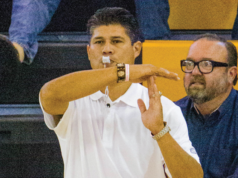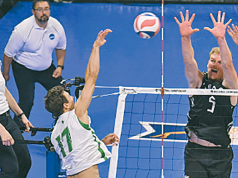Whether it is during the prematch conference or a postmatch debrief, a formal evaluation or a self-evaluation, or in a classroom clinic setting, we have so many opportunities to learn. We must take advantage of those opportunities to improve our skills and rules knowledge, and in turn, improve the entire cadre of officials. Future generations of players, coaches and officials are counting on it.
My oldest son, a second grader, brings home a behavior chart every day that each child in the class is required to have signed by mom or dad. The average on the chart is “ready to learn.” That is the minimum we would expect from a second grader. Above “ready to learn” is “good job,” “outstanding” and “excellent” at the top. We shouldn’t have to talk about what’s below “ready to learn” since we are all professionals who should have higher standards than the average second grader, so let’s focus on “ready to learn.”
You just finished a lopsided match with a partner you have worked with countless times before. Do you gloss over the postmatch debrief or do you share honest, constructive feedback to one another? It doesn’t have to be something either of you did incorrectly. It could be as simple as offering a better way to handle a given situation. Maybe one of you had a chance to read the latest rules interpretation bulletin or viewed an online training module, so you have something to share about a situation you encountered in your match. Listen to what is discussed. It is a great chance to learn.
Be an active, engaged listener and participate during clinics and debriefs. Don’t let the information you receive from a clinic, an online training module or a postmatch debrief go in one ear and out the other. Don’t rest on your laurels just because you’ve been officiating for 20 years and you’ve heard it all before.
During clinics or during a break, there is a lot to learn from all the knowledge in the room. Find a mentor, and ask questions. If you are a veteran, share your insight and knowledge and offer to be that mentor. Without mentors sharing their knowledge, we wouldn’t be where we are today. If you have a few years experience, you should be able to help beginners learn. If you have vast experience, share your wisdom appropriately, just like those before you shared theirs.
You never know when a teachable moment and a learning opportunity will come your way. I once had the pleasure of observing a high-level referee at a USAV tournament early in the season. I noticed a small habit the referee had — he spit the whistle out of his mouth after whistling for substitutions. I mentioned during the postmatch debrief that it may appear a little sloppy. That high-level veteran could have just nodded while pretending to care about that little observation, but instead, he actively listened. He hadn’t even realized that he did that. After all these years, no one had bothered to mention anything about it. Five months later, we ran into one another at another tournament. He went out of his way to thank me for pointing that out. He had already broken his old habit and was very pleased with his new approach to handling substitutions.
No matter what learning opportunity presents itself, no matter who presents the material, ask yourself, are you really ready to learn? Your answer is already determining your officiating path. There is valuable information out there, and it’s important to each and every official’s growth. Those who are willing to listen and implement the things they learn along the way will continue to improve. Those who go through the motions may become stagnant while others around them improve. The choice is yours. Let’s all focus on always being, at the very least, ready to learn.
What's Your Call? Leave a Comment:
Note: This article is archival in nature. Rules, interpretations, mechanics, philosophies and other information may or may not be correct for the current year.
This article is the copyright of ©Referee Enterprises, Inc., and may not be republished in whole or in part online, in print or in any capacity without expressed written permission from Referee. The article is made available for educational use by individuals.

















